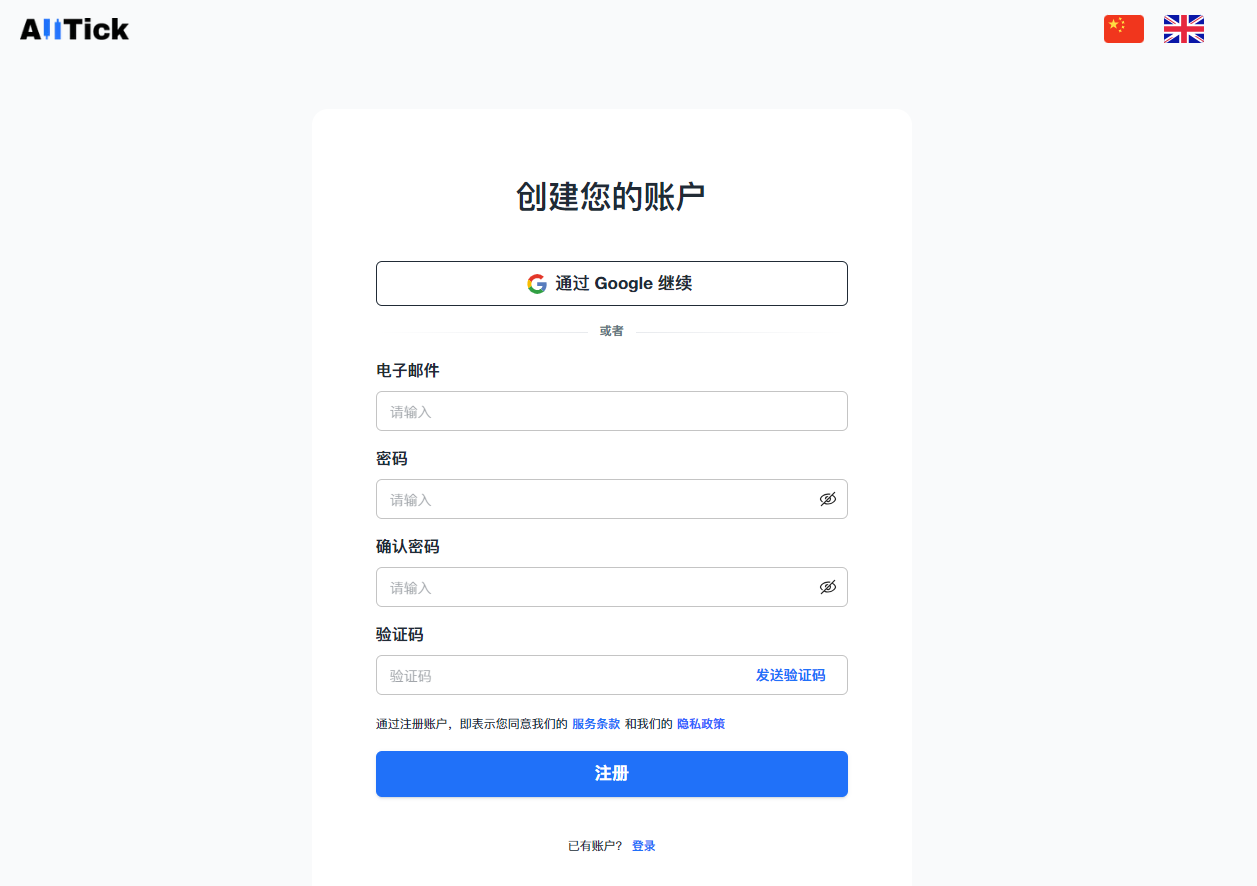外汇市场是全球流动性最强、交易量最大的金融市场,每天的交易量超过数万亿美元。与其他金融市场相比,外汇市场具有高度波动性,受地缘政治事件、经济数据发布等多种因素影响,导致汇率在短时间内剧烈波动。因此,外汇交易者对实时数据有极高的需求,以确保能及时把握市场机会、规避风险。
API的核心功能
外汇实时行情API提供了丰富的数据服务,涵盖了主要货币对(如EUR/USD、USD/JPY)以及一些次要或异国货币对的实时报价。通过该API,用户可以获取最新的汇率数据、买卖价格、历史数据,以及其他相关的市场信息。这些功能可以帮助交易平台为用户提供更精确的数据支持,使他们能够随时查看重要的市场信息,分析价格走势,制定交易策略。
API在交易平台中的应用价值
集成外汇实时行情API,可以显著提升交易平台的功能性和竞争力。通过实时行情数据,交易者能够在市场变化的瞬间做出决策,优化交易策略。例如,在高频交易或量化策略中,实时数据是制定买卖信号、调仓策略的核心依据。实时行情API为交易者提供了准确而及时的市场数据,有助于提升交易的精确性和执行效率,确保平台在快速变化的市场中保持竞争优势。
交易平台集成API的准备工作
外汇实时行情接口主要以国外的产品居多,像彭博,Finnhub,AllTick等,各家产品都有不同的优劣,这里以AllTick作为演示,因为有免费试用套餐,前期无需任何成本,也有中文客服,对国内用户比较友好。
先在官网 (https://alltick.co/) 注册账号(访问需科学上网),没有工具可访问备用地址:https://alltick.io
注册完后就会跳转到用户后台,拿到API Key,发送查询时需要带上。
AllTick的外汇行情API支持多种协议,常见的有RESTful API和WebSocket。RESTful API适合于按需请求的场景,比如定期查询实时数据或历史数据;WebSocket则适用于需要持续接收实时数据的场景,如交易平台的行情更新板块。开发者可以根据交易平台的实际需求,选择合适的协议进行集成。API兼容常见的编程语言和开发框架,例如Python、JavaScript、Java等,确保能在大多数交易平台环境中顺利运行。
如何使用外汇行情API获取数据
完整的文档可以看Github:https://github.com/alltick/realtime-forex-crypto-stock-tick-finance-websocket-api/blob/main/access_guide_cn.md
下面是查询USDEUR实时行情的示例:
import time
import requests
import json
# Extra headers
test_headers = {
'Content-Type': 'application/json'
}
'''
# Special Note:
# GitHub: https://github.com/alltick/realtime-forex-crypto-stock-tick-finance-websocket-api
# Token Application: https://alltick.co
# 备用网址:https://alltick.io
# Replace "testtoken" in the URL below with your own token
# API address for forex:
# https://quote.tradeswitcher.com/quote-b-ws-api
Encode the following JSON and copy it to the "query" field of the HTTP query string
{"trace": "forex_http_test1", "data": {"code": "USDEUR", "kline_type": 1, "kline_timestamp_end": 0, "query_kline_num": 2, "adjust_type": 0}}
'''
# Example URL for querying USDEUR forex data
test_url = 'https://quote.tradeswitcher.com/quote-b-ws-api/kline?token=testtoken&query=%7B%22trace%22%3A%20%22forex_http_test1%22%2C%22data%22%3A%20%7B%22code%22%3A%20%22USDEUR%22%2C%22kline_type%22%3A%201%2C%22kline_timestamp_end%22%3A%200%2C%22query_kline_num%22%3A%202%2C%22adjust_type%22%3A%200%7D%7D'
# Send the request
response = requests.get(url=test_url, headers=test_headers)
time.sleep(1)
# Decoded text returned by the request
text = response.text
print(text)
通过Websocket订阅USDGBP的实时行情:
import json
import websocket # pip install websocket-client
'''
# Special Note:
# GitHub: https://github.com/alltick/realtime-forex-crypto-stock-tick-finance-websocket-api
# Token Application: https://alltick.co
# 备用网址:https://alltick.io
# Replace "testtoken" in the URL below with your own token
# API addresses for forex, cryptocurrencies, and precious metals:
# wss://quote.tradeswitcher.com/quote-b-ws-api
# Stock API address:
# wss://quote.tradeswitcher.com/quote-stock-b-ws-api
'''
class Feed(object):
def __init__(self):
self.url = 'wss://quote.tradeswitcher.com/quote-b-ws-api?token=testtoken' # Enter your websocket URL here
self.ws = None
def on_open(self, ws):
"""
Callback object which is called at opening websocket.
1 argument:
@ ws: the WebSocketApp object
"""
print('A new WebSocketApp is opened!')
# Start subscribing (modified for USDGBP)
sub_param = {
"cmd_id": 22002,
"seq_id": 123,
"trace":"3baaa938-f92c-4a74-a228-fd49d5e2f8bc-1678419657806",
"data":{
"symbol_list":[
{
"code": "USDGBP",
"depth_level": 5,
}
]
}
}
# If you want to run for a long time, you need to modify the code to send heartbeats periodically to avoid disconnection, please refer to the API documentation for details
sub_str = json.dumps(sub_param)
ws.send(sub_str)
print("depth quote for USDGBP are subscribed!")
def on_data(self, ws, string, type, continue_flag):
"""
4 arguments.
The 1st argument is this class object.
The 2nd argument is utf-8 string which we get from the server.
The 3rd argument is data type. ABNF.OPCODE_TEXT or ABNF.OPCODE_BINARY will be came.
The 4th argument is continue flag. If 0, the data continue
"""
def on_message(self, ws, message):
"""
Callback object which is called when received data.
2 arguments:
@ ws: the WebSocketApp object
@ message: utf-8 data received from the server
"""
# Parse the received message
result = eval(message)
print(result)
def on_error(self, ws, error):
"""
Callback object which is called when got an error.
2 arguments:
@ ws: the WebSocketApp object
@ error: exception object
"""
print(error)
def on_close(self, ws, close_status_code, close_msg):
"""
Callback object which is called when the connection is closed.
2 arguments:
@ ws: the WebSocketApp object
@ close_status_code
@ close_msg
"""
print('The connection is closed!')
def start(self):
self.ws = websocket.WebSocketApp(
self.url,
on_open=self.on_open,
on_message=self.on_message,
on_data=self.on_data,
on_error=self.on_error,
on_close=self.on_close,
)
self.ws.run_forever()
if __name__ == "__main__":
feed = Feed()
feed.start()
将API集成到交易平台的具体步骤
为了确保外汇实时数据可以准确集成到交易平台,需要编写API请求代码,并设计一个专门的数据获取模块,将API返回的数据转换为平台所需的数据格式。这个模块应包括以下步骤:
- API请求代码:发送GET或POST请求获取实时或历史外汇数据。
- 数据格式转换:将API返回的数据(通常为JSON格式)解析为平台支持的格式,例如表格或图形。
- 存储与管理:数据获取后,可以选择将其存储在数据库中,方便后续分析与使用。
- UI界面更新:数据准备好后,调用函数或方法更新交易平台的UI,显示最新的行情数据。
以下是一个API请求的代码示例,展示如何发送请求、处理返回数据并更新UI:
import requests
import json
def fetch_forex_data():
url = 'https://quote.tradeswitcher.com/quote-b-api/forex-tick?token=YOUR_TOKEN'
params = {
"trace": "forex_data_request",
"data": {"symbol_list": [{"code": "USDGBP"}]}
}
response = requests.get(url, params=params)
if response.status_code == 200:
data = response.json()
# 转换数据格式并更新UI
update_ui(data)
else:
print("Failed to fetch data:", response.status_code)
def update_ui(data):
# 根据平台的UI需求更新数据展示
print("Updated UI with data:", data)
实时数据流的接入:
通过WebSocket技术可以实现持续的数据流接入,从而自动更新外汇行情数据。WebSocket连接一旦建立,就能保持持续的连接状态,接收服务端推送的最新数据。
- 建立WebSocket连接:与API服务器保持持续的连接。
- 数据处理与展示:每当有新的行情数据推送时,实时处理数据并更新平台界面。
- 自动重连:如果连接断开,需要设计自动重连机制,确保数据流的连续性。
以下是通过WebSocket接入实时数据流的代码示例:
import websocket
import json
def on_message(ws, message):
data = json.loads(message)
# 更新平台界面
update_ui(data)
def on_error(ws, error):
print("WebSocket error:", error)
def on_close(ws):
print("WebSocket closed. Attempting to reconnect...")
# 自动重连
start_websocket()
def on_open(ws):
print("WebSocket connection opened.")
sub_param = {
"cmd_id": 22002,
"seq_id": 123,
"trace": "realtime_forex_data",
"data": {
"symbol_list": [{"code": "USDGBP", "depth_level": 5}]
}
}
ws.send(json.dumps(sub_param))
def start_websocket():
ws = websocket.WebSocketApp(
"wss://quote.tradeswitcher.com/quote-b-ws-api?token=YOUR_TOKEN",
on_open=on_open,
on_message=on_message,
on_error=on_error,
on_close=on_close
)
ws.run_forever()
start_websocket()
错误处理和数据验证:
在集成API的过程中,可能会遇到网络波动、API请求失败或数据异常的情况。因此,需要设计一个可靠的错误处理和数据验证模块,以确保数据获取的稳定性和准确性。
- 请求失败处理:为API请求设置重试机制,如在网络波动时多次尝试获取数据。
- 数据完整性验证:收到数据后,检查数据结构是否符合预期,以避免数据展示出错。
- 异常处理逻辑:捕获数据异常,防止平台出现错误展示或崩溃。
以下是一个基础的错误处理和数据验证示例代码:
def fetch_forex_data_with_error_handling():
try:
url = 'https://quote.tradeswitcher.com/quote-b-api/forex-tick?token=YOUR_TOKEN'
params = {"trace": "forex_data_request", "data": {"symbol_list": [{"code": "USDGBP"}]}}
response = requests.get(url, params=params)
response.raise_for_status() # 检查HTTP错误
data = response.json()
if "symbol_list" in data and isinstance(data["symbol_list"], list):
update_ui(data)
else:
print("Data format error: Unexpected data structure")
except requests.exceptions.RequestException as e:
print("Network error or API request failed:", e)
except json.JSONDecodeError:
print("Failed to decode JSON response")
这些步骤和代码示例展示了如何将外汇实时行情API集成到交易平台,确保数据的准确性和稳定性,从而帮助交易者更快、更准确地做出交易决策。
性能优化与数据缓存策略
为了降低API调用次数、减少延迟并提高平台的响应速度,可以使用本地缓存策略。通过缓存数据,平台可以避免频繁调用API获取相同的数据,尤其是在数据频率不高或短时间内不会变化太多的情况下。
缓存策略设计:可以将某些频繁请求的数据暂存到本地(如内存或数据库),并设置一定的缓存过期时间,过期后再进行API请求。
以下代码展示如何缓存外汇数据,并设置过期时间:
import time
# 缓存结构,带有数据和过期时间
cache = {}
def get_data_with_cache(symbol, cache_duration=60):
current_time = time.time()
if symbol in cache and current_time - cache[symbol]["timestamp"] < cache_duration:
print("使用缓存的数据")
return cache[symbol]["data"]
else:
# 模拟API请求获取新数据
new_data = api_request(symbol)
cache[symbol] = {"data": new_data, "timestamp": current_time}
print("API请求新数据")
return new_data
def api_request(symbol):
# 模拟API请求
return {"symbol": symbol, "price": 1.3035} # 示例返回数据
# 调用示例
get_data_with_cache("USDGBP")
API调用频率控制:
在高频获取数据时,严格控制API调用频率有助于避免超出API服务的限额,同时降低API使用成本。
限制调用频率:使用基于时间的限制器(例如每分钟的最大请求数)来防止过于频繁地调用API。
实现频率控制:可以用装饰器或计时器来管理调用频率。以下示例展示如何限制每秒调用一次API:
import time
last_call_time = 0
call_interval = 1 # 每次API调用间隔1秒
def limited_api_call(symbol):
global last_call_time
current_time = time.time()
if current_time - last_call_time >= call_interval:
last_call_time = current_time
return api_request(symbol)
else:
print("调用频率受限,请稍后再试")
# 示例调用
limited_api_call("USDGBP")
优化网络请求:
选择合适的网络请求库或框架,可以提升获取实时行情数据的效率,确保数据传输速度和稳定性。
- 选择适合的库:推荐使用轻量级、快速的库(如requests、httpx)来提高HTTP请求的性能,同时使用异步请求(如aiohttp)进一步优化高频调用的效率。
- WebSocket优化:对于实时数据流,可以使用WebSocket连接而非HTTP轮询,以降低延迟和带宽消耗,并确保数据实时性。
import asyncio
import aiohttp
async def fetch_data_async(url):
async with aiohttp.ClientSession() as session:
async with session.get(url) as response:
return await response.json()
async def main():
url = "https://api.example.com/data"
data = await fetch_data_async(url)
print(data)
# 异步调用
asyncio.run(main())
通过数据缓存、频率控制和网络请求优化策略,可以显著提升外汇数据API的性能和可靠性,从而改善平台整体体验。
共同学习,写下你的评论
评论加载中...
作者其他优质文章






